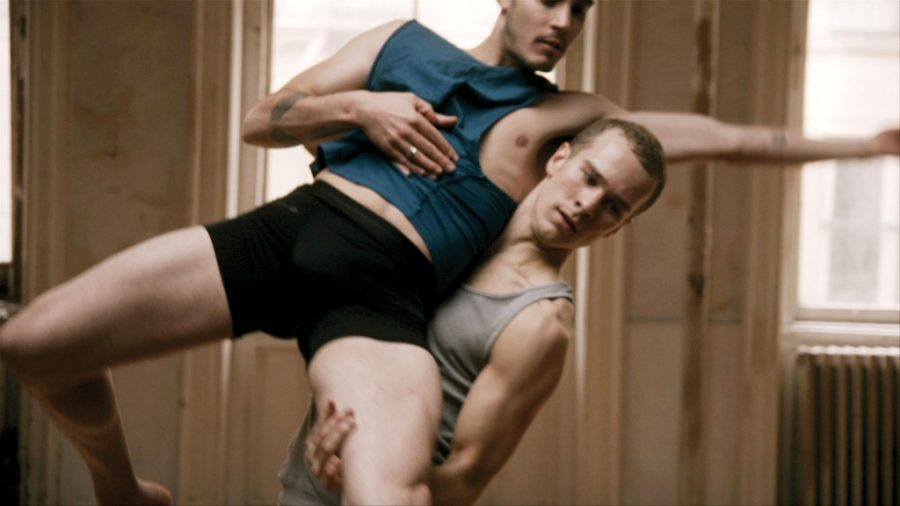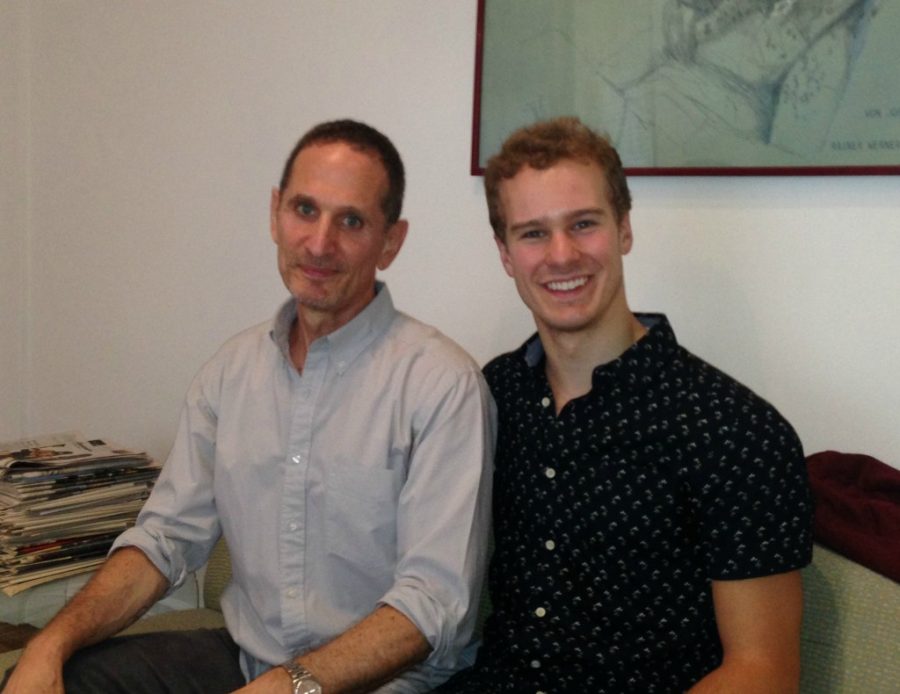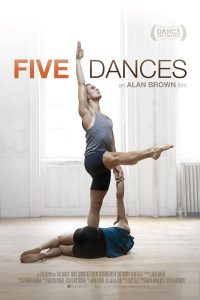
 Set in the world of professional dancing, Alan Brown's "Five Dances" is a beautiful movie about finding yourself once you're away from home. Broadway dancer Ryan Steele ("Matilda", "Newsies") makes his feature length debut as Chip, a young man recently arrived in New York City who tries luck in a dance studio going against his mother's wishes. With a small ensemble and a breathtaking five-part dance piece which serves to divide the film in chapters, "Five Dances" is a unique film that defies conventions about dance movies and goes for un-showy character study through an art that film has captured poorly.
Set in the world of professional dancing, Alan Brown's "Five Dances" is a beautiful movie about finding yourself once you're away from home. Broadway dancer Ryan Steele ("Matilda", "Newsies") makes his feature length debut as Chip, a young man recently arrived in New York City who tries luck in a dance studio going against his mother's wishes. With a small ensemble and a breathtaking five-part dance piece which serves to divide the film in chapters, "Five Dances" is a unique film that defies conventions about dance movies and goes for un-showy character study through an art that film has captured poorly.
Director Brown, known for movies like "Private Romeo" and "Book of Love", brings his trademark view to this film; a combination of intellect and tender romance that explore different art forms as ways to find connections between people who think they're so different. In this film we meet the small company, all of whom have very different lifestyles, but seem to become one when they're performing. Never one to stick to a label, Brown delivers an enchanting work that could easily be seen as a dance movie, a coming of age story, a swoon-worthy gay romance and a study of the beauty in human anatomy.
We recently sat with Brown and Steele to discuss the making of film, including the casting process, the director's sources of inspiration, film distribution and one of Ryan's unknown talents...
StageBuddy: Alan, how did you end up casting Ryan?
Alan: Ryan was pretty much the exception, we did an open call through our wonderful casting director and she sent out a regular breakdown which was for dancers between the ages of 18 and I think 38, male or female, who were interested or had some background in acting or were interested in improvisation. I happened to talk to a number of choreographers and getting the word out. The film was very undefined at the time...but there was one role that was there from the very beginning and it was the role of an 18 year old dancer who could kind of do anything, who had immense talent - as you can see on the very first scene of the film - and I was telling this choreographer I was looking for this astonishingly talented dancer and he said “get Ryan Steele”. So we brought him in and it turned out, shockingly, that he could also act! He had natural talent and I did something which I’ve never done before, which is I hired him on the spot.
StageBuddy: What attracted you to the screenplay? Did you see any of yourself in Chip?
Ryan: Eventually definitely. I went into the audition process with no expectations, it was a way of practicing auditioning, of practicing speaking out loud in front of a table of people who were judging me. Eventually I definitely connected to the character and the team and had a great time.
StageBuddy: Even if the film is set in New York City, the city itself doesn’t seem to play a big part. Most of the film is set inside the one dance studio and characters’ apartments...so how do you think NYC affects these characters? Could this story have been set anywhere else for that matter?
Ryan: I think it definitely raised the stakes for Chip because he would probably be different if he’d moved to Orlando, Florida for example, but NYC is so cutthroat and terrifying so anything that you experience with the weight of the city is heightened.
Alan: I would say it actually is a very New York film because if you’re a professional dancer you spend your life in that studio. That is your world and we chose for a location a very archetypical New York studio which you wouldn’t find anywhere else. It was on Grand Street and it had all those architectural details that let you know you’re in NY plus there’s also the intensity and the talent of the people. That’s the funny thing about this city, for NY to play heavily in something you don’t need to do the cliché scene of a lot of New York locations, because there are so many different worlds in the city and what we were recreating was this specific world of downtown dancing.
StageBuddy: One of the most fascinating things about the film is that you can pretty much tell the entire story through the dances. How was the process of working with the choreographer to achieve that?
Alan: Jonah Bokaer, the choreographer, has been a friend of mine for over 14 years. Jonah created per our discussions an abstract five dance piece, with certain parameters, but he never saw a screenplay or a treatment, the idea was that he would create an abstract work. He was there for the auditions, so together we chose the cast and dancers who would work for him. He created it basically to give me a structure, a language to build my film on. After he created it he left, he never came to the production, or the editing room. He saw the movie when it was finished.
StageBuddy: Did he add the music as well?
Alan: No, he created it in silence. Not even with counts! The editor and I, from the very beginning started adding music we thought would fit. We started playing music we knew we couldn’t get, like Joni Mitchell or Jeff Buckley...just to try different sounds. Then we found Scott Matthews and Perfume Genius and once we found the songs we molded everything together.
StageBuddy: Ryan, this is your film debut, can you talk about how the experience was compared to being on Broadway every night?
Ryan: It was very different. The preparation is extremely different, when you’re on a Broadway show you rehearse for five weeks and then every single step is clean and every single scene is well rehearsed and this process was so quick. The five of us [the cast] didn’t have much experience on film and TV, so it was very rushed, we only had two weeks to do it. I feel like I learned so much, cause also when you’re onstage you get a sense of the audience and how they feel about the piece and when you’re performing in front of a camera you don’t have that. Luckily we had a wonderful team behind the camera but it’s sort of scary cause you don’t know what you’re putting out there.
 StageBuddy: How did you come up with Chip’s strange ventriloquist trick?
StageBuddy: How did you come up with Chip’s strange ventriloquist trick?
Ryan: [Laughs] ...you’re talking about the man in the mouth?
StageBuddy: Yeah.
Ryan: So, I went to Alan’s apartment to have a meeting before we went into production and discuss the character and at the end of the meeting Alan was like “so, do you have any of those special skills that actors usually have on the bottom of the resume?”. I said, I sorta have thing thing I do with my voice called “the man in the mouth”...
Alan: …and it’s in the movie! That was it. It’s the big hit in the movie.
StageBuddy: Do you think you would’ve been able to make this film with a cast of non-professional dancers?
Alan: From the beginning I was not looking for actors who could dance, but for dancers who wanted to act. They are very different skills and it’s rare to find dancers who can act. We also wanted a particular kind of dancer, we wanted cohesiveness and to create the feeling of a downtown studio company. Ryan was on Broadway but he was raised in the studio and has a ballet background. With a different cast it would’ve been a completely different movie. This was the first movie where I went in without a finished script, I just molded it around the people I was working with.
StageBuddy: What kind of research did you do to become familiar with dance? Did you watch any movies, documentaries?
Alan: I saw everything. Derek Mckane (the film’s cinematographer) and I watched everything available and then I spent a lot of time at Lincoln Center’s archives where there is thousand of footage available. I discovered quickly that most of it did not interest me. Most dance is filmed in a very uninteresting way, it’s filmed to be seen with the proscenium and you have to see the whole body. What I found did interest me was all the rehearsal footage, it was very informal and showed the process which is always very interesting.
StageBuddy: The film was photographed beautifully and the lighting often adjusts to Chip’s mood. How did you approach the cinematography?
Alan: Derek and I are very close, we had certain decisions, for example when we break into the five dances, which all came out of Chip’s head, we changed the palette, it was more washed out. These dance moments are mental manifestations of his problems and I think that’s what you’re seeing with those cooler colors, which are opposite to the more natural lighting when everyone’s hanging out in the studio. The romantic moments were shot at night, with beautiful lightning that added a sculptural touch to their bodies. A lot of the coloring came in editing, we worked with a wonderful colorist and we spent weeks in there adjusting the color to what we wanted.
 StageBuddy: Chip is a very quiet character and you seemed so comfortable in front of the camera being silent. How did you achieve that?
StageBuddy: Chip is a very quiet character and you seemed so comfortable in front of the camera being silent. How did you achieve that?
Ryan: When you grow up dancing you grow up communicating without speaking. In terms of being comfortable in front of the camera it took me a few days I think…
Alan: He was the fastest though!
Ryan: I think because of all of us were on the same page of “holy cow, there’s a giant machine in front of us shooting everything that we do in HD” we all had to go through it together and that helped a lot.
StageBuddy: Unlike most gay films which rely on clichés and preposterous character development, your films have a sensibility that makes them tender and fascinating to watch. How do you approach your writing to achieve that?
Alan: Someone recently remarked something after seeing my movies and what they said was “you’re a romantic!”. I am not! [They both laugh] It’s not hip to be a sentimental but I am. I think it’s in my nature, which is hard to admit because I’m a New Yorker but I’m a romantic. But also there’s so little truly romantic gay imagery on film. Sure there are gay characters who are very ironic, sarcastic or bitchy and I think we definitely need it. It means a lot to me as a gay man to see these gay characters fall in love. I used to make very grim movies, and I think it’s harder to make movies where you don’t wanna leave the characters. We tried to achieve that in the last scene, cause I like that moment as a moviegoer when the film ends and you go “no!”.
StageBuddy: Where do you get inspired then?
Alan: Not from gay movies definitely…My parents, who passed away recently, had a wonderful marriage and even after 40 or 50 years together they used to hold hands when they were watching TV. I think as a gay man growing up it’s what I didn’t see in movies and I wanted it, so I think from that longing and wanting to see it. I can name a dozen beautiful love and sex scenes in movies growing up that were straight. Donald Sutherland and Julie Christie! I wanted to see gay people in love. Ryan and Reed (Luplau) had such a great friendship and it helped me create their romantic scene which didn’t exist originally.
StageBuddy: Ryan, you’ve been dancing since you were eleven.
Ryan: six!
StageBuddy: Wow!
Ryan: [laughs]
Where do you see your career going next?
Ryan: I think it’s a dangerous thing in this city to sort of limit yourself. You can’t say no to the opportunities that come to you. I definitely know I wanna do more film and TV and keep dancing and doing what I love. I’m lucky enough to do what I love.
StageBuddy: Alan, how about your next projects?
Alan: I’m working on a film we start shooting in the spring, it’s a love triangle but the actors sing. It’s inspired by the French anti musical musicals, like “Love Songs”. The story is about a husband and wife and he has an accident, loses his memory and falls in love with a man...and they sing! It probably would come out in late 2014.
StageBuddy: Are you taking “Five Dances” to festivals?
Alan: Yes definitely. It actually opened theatrically in Paris in June. We have been to a lot of international festivals and we’re starting the domestic ones.
StageBuddy: At some point are you planning to have just the dance pieces onstage?
Alan: No. It would be lovely to do, logistically it would be difficult. Jonah owns the work so theoretically he could recreate it with different people but I don’t think he’d want to after seeing Ryan do it.
StageBuddy: How have you felt about the way in which critics and audiences have reacted to the film?
Ryan: It’s been exciting. I haven’t had a lot of friends or people close to me see it, so I’ll let you know in a week…[laughs]
StageBuddy: Currently we have a problem in distribution when it comes to smaller films, not to mention gay themed films. Knowing this about the market, what are your expectations about the film’s performance?
Alan: We’ve all been very fortunate because this one got picked up immediately. The film has been sold in more than ten countries. It’s getting a wider foreign release. To even have a small theatrical release for a small gay film like this is very unusual, it’s hard and nobody wants to do theatrical, but we’re very fortunate.
"Five Dances" is now playing at the Cinema Village. For more information about the movie visit https://www.fivedancesthemovie.com/